|
The 1920s and early 1930s were a
time of industrial recession, resulting in a large
number of unemployed people, and much hardship. Although
the situation began to improve in the early 1930s, it
took the threat of war in the late 1930s, and Ministry
orders for essential war work, to allow industry to
ramp-up, and work flat out again. In August 1938 there
were 7,671 unemployed people in Walsall, which had
fallen to just 533 by August 1940.
All kinds of products were
manufactured in Walsall as part of the war effort. Shannons produced large numbers of military uniforms,
Patterson and Stone made leather flying helmets, Walker
Brothers made Anderson shelters, Helliwells repaired
military aircraft, and T. Partridge & Company Limited
built 2,000 Morrison Shelters, and carried out
rapid repairs to factories that were damaged during the
bombing campaign. The firm also built fire service
garages in the London area, and manufactured gun
shields, machine gun brackets, gun pedestals, winch
casings for ships, davit frames, fulcrum brackets for
tanks, flail arms for mine destroying Scorpion tanks,
and parts for Bailey bridges.
|
| Although war seemed inevitable to
many people, most would have settled for peace. It took
some time for the local population to accept that war
would eventually be declared, especially in September
1938 when Prime Minister Neville Chamberlain appeared to
appease Hitler, and return with his misleading Munich
Agreement, in which Hitler stated that he did not want
to go to war. On 31st March, 1937 Britain and
France guaranteed to defend Poland from any
attempted invasion by Germany, an agreement which would
eventually lead to war. The appeasement of Hitler ended when
German troops marched into Czechoslovakia in March 1939.
War was eventually declared on 3rd September, 1939, two days
after Germany invaded Poland. The delay in going to war
had at least allowed Britain's armed forces, and the
country as a whole to prepare for the inevitable
struggle that lay ahead.
Air raids were seen as an obvious
threat, particularly because of the development of
bomber aircraft. In March 1935 the Air Raid Precautions
Department was formed to oversee civil defence measures
throughout the country.
|
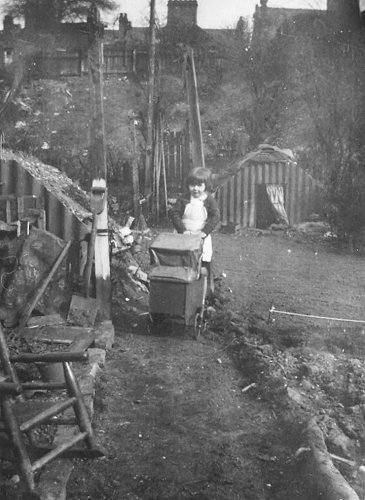
Anderson air raid shelters in a back
garden in Ward Street, Walsall. Courtesy of John and
Christine Ashmore. |
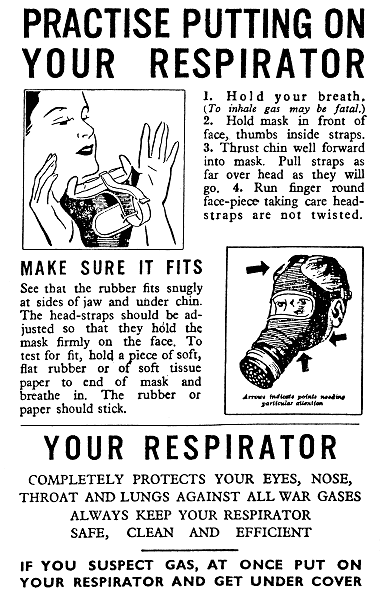 |
Air Raid Precautions Acts
were passed in 1937 and 1938 which required
local authorities to make plans to protect the
population from the effects of enemy bombing.
Air raid wardens would be appointed,
preparations would be made for the fire and
ambulance services to deal with emergencies, and
gas masks, and air raid shelters would be
provided. Help was also on hand from the Women's
Voluntary Service, and the Civil Defence
Reserve.
By June 1938 Walsall had
850 volunteer Air Raid Wardens, known as ARP
wardens, who patrolled the streets at night to
ensure that no light would be visible to enemy
aircraft. They would order people to put a light
out, or cover a window, and could report
persistent offenders to the police. They also
kept a lookout for, and doused incendiary bombs
whenever possible, and were trained in first
aid.
They were aided by workers
from local factories who had to carry out fire
watching. By the beginning of the war, 4,200
Anderson shelters were in use in the town. They
were free to any family earning less than £250 a
year. In February 1939 gas masks were issued to
the local population, and in September of that
year, 491 children from the Birchills, Bridge,
Hatherton and Paddock wards were evacuated to
the Staffordshire villages of Brewood,
Blymhill, Coven, and Penkridge. |
|
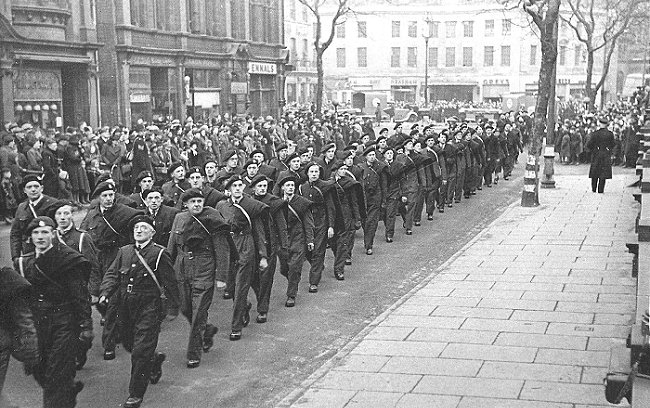
A march of ARP wardens
through Walsall. Courtesy of John and Christine Ashmore. |
|
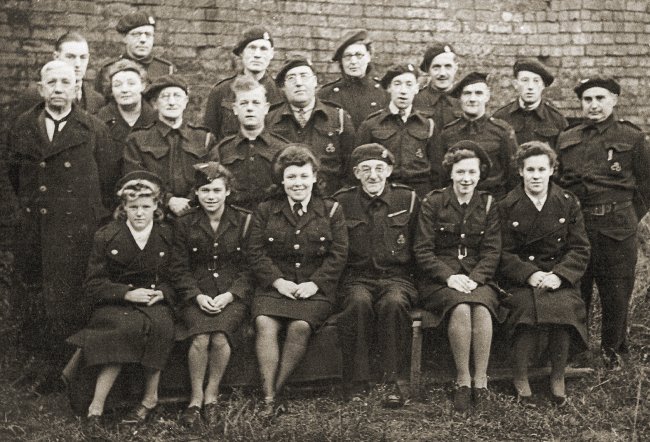
A group of Walsall ARP
wardens. Courtesy of John and Christine Ashmore. |
|
In 1944 things swung in the
other direction when Walsall became a reception
area for around 1,500 evacuees from the V1 and
V2 rocket attacks on London.
Other visitors included the
United States 10th Replacement Depot, based at
Whittington Barracks in Lichfield. Some of the
American soldiers were billeted in Pheasey.
There were also German prisoners of war, held at
a prison camp in Aldridge Road.
At the outbreak of war,
male conscription into the armed forces was
immediately ordered under the terms of the
National Service (Armed Forces) Act.
Initially all men from 18
to 41 years old could be called-up, unless they
failed the medical, or worked in a vital
occupation, known as a reserved occupation. Many
who were not eligible for military service
joined the Home Guard to become local defence
volunteers, who trained in readiness for an
invasion. |
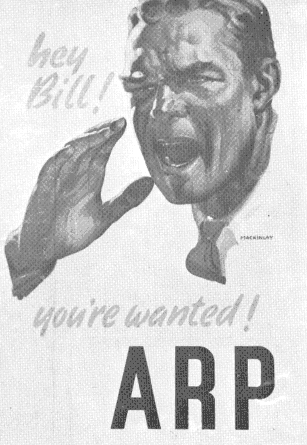 |
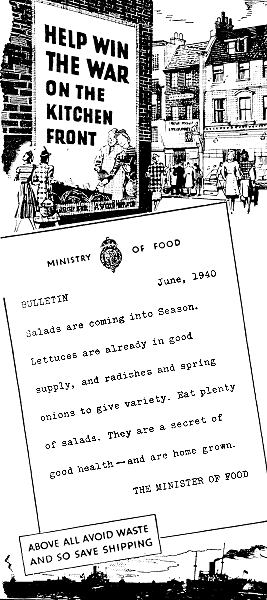 |
Numerous women joined a
number of organisations including the Women’s
Voluntary Service, which ran a hostel for young
women in Bradford Street, and the Auxiliary
Territorial Service, known as the ATS. This was
the women's branch of the British Army, formed
on 9th September, 1938 as a women's voluntary
service.
From 1943, some of the male
conscripts were sent to work in the essential
coal mines, and became known as "Bevin Boys".
Food rationing began in
January 1940 after vital food supplies were
being lost as a result of the continuous sinking
of Allied merchant ships by German submarines.
In order to ensure a fair
distribution of supplies, Ministry of Food
ration books were issued to everyone, and people
had to register at a shop. There were shortages
of cereals, fruit, meat, and sugar.
People were encouraged to
grow their own fruit and vegetables by the Dig
For Victory campaign, organised by the Ministry
of Food. Chickens, pigs, and even rabbits were
reared for meat, and many people applied for
allotments.
Wasting food became a
criminal offence, and because of the sugar
shortage, sweets were rationed from July 1942.
Local schools helped with the shortages by
growing food, and even rearing chickens and
pigs. |
| Walsall did suffer during the German air
raids, but got off lightly considering its
industrial importance. On the night of 25th
June, 1940 bombs were dropped at Daw End, and on
the night of 25th August, 1940 the Public Works
Department in Bloxwich Road was destroyed.
In November of that year, one man was killed
in Walsall, twelve people died in
Willenhall, and a bomb fell on Pleck gasworks,
which luckily did not explode.
The gasworks superintendent, Richard Hateley,
successfully managed to avoid an explosion in
one of the gas holders, and was awarded the
George Medal for his efforts. |
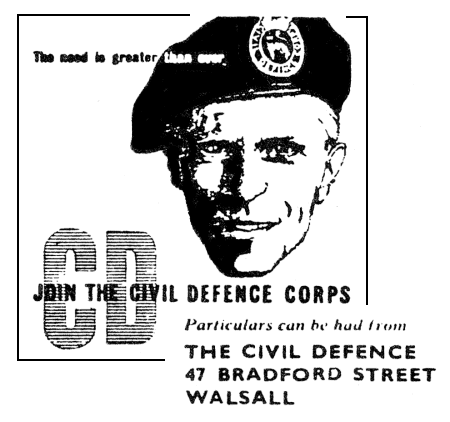 |
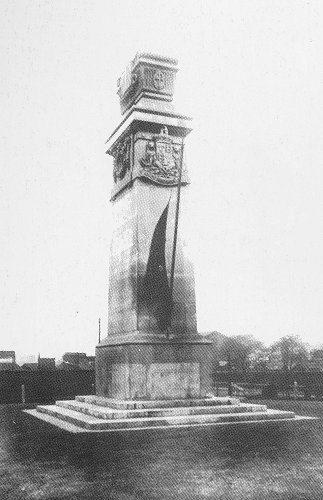
The Cenotaph in Bradford
Place, Walsall. From an old postcard. |
In June 1941 eleven people
died during an air raid on Darlaston, and five
watchmen were killed by an incendiary bomb
whilst sheltering in their hut.
Most damage was caused
during an air raid on 31st July, 1942 when
Leamore bus depot was destroyed, as was much of
Croft Street School. Hawley’s factory on
Lichfield Road was badly damaged, as were a number of houses in Borneo Street.
Many celebrations were held
in the town after the official announcement of
the end of the war in Europe, which was made on
Tuesday 8th May, 1945. The streets filled with
people, and buildings carried flags, and large
images of the Allied leaders.
During the evening, a
Mayoral procession was held, along with a
service of thanksgiving at the Parish Church. A
vast crowd gathered on The Bridge, the Council
House was flood-lit, and people danced on the
forecourt.
Street parties were rapidly
planned, bonfires lit, and a large illuminated
caricature of Winston Churchill was moored on a
raft in the centre of the Arboretum lake. |
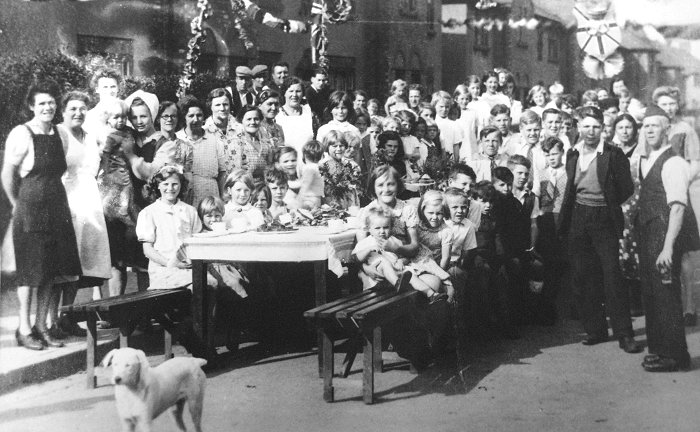
The VE Day street party that was
held in Lowe Avenue, Darlaston. Courtesy of Mavis Young.
| In April 1948 a War Memorial Committee was
formed to decide upon suitable memorials for the
town. They decided that three additional
memorial plaques were to be erected in the Town
Hall to carry the names of the 741 Walsall
people who gave their lives in the defence of
their country, and that further inscriptions
would be added to the cenotaph in Bradford
Place, and to Bloxwich War Memorial. |
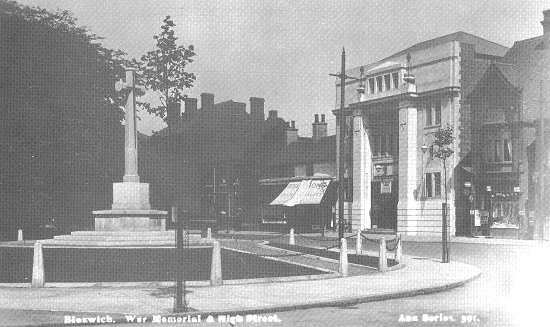
Bloxwich War Memorial.
From an old postcard. |
| The additions were seen as fitting tributes,
and a permanent reminder of those who had
selflessly given their lives to their country,
during the terrible struggle that had now
ended. |
 |
|
 |
|
 |
Return to the
George Hotel |
|
Return to
the beginning |
|
Proceed
to
Recent Times |
|